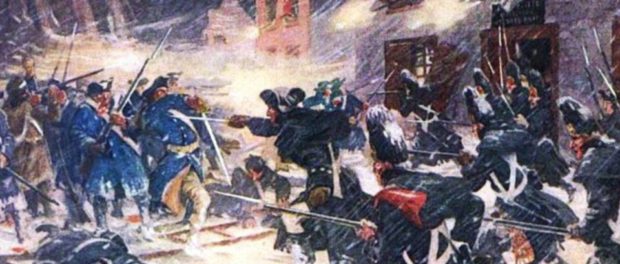1775-1781: Revolting People and Benedict Arnold & Other Quebec Curios
Part of “A Colony in Transition”, 1763-1791
Name George Washington or Thomas Jefferson as one of the important figures of the American Revolution, but it does seem that somehow, a lot of the action leads back to Benedict Arnold. He was one of the people involved invasion of Quebec with the Revolutionaries’ Quebec campaign in 1775. The campaign alternatively sought French Canadians to come join their cause as well as conquer Quebec, but the Americans-to-be proved unsuccessful at this venture. The Battle of Quebec, occurring in December in the middle of a snowstorm, wounded Arnold and killed one of the Revolutionaries’ leaders, Richard Montgomery. During the campaign, the Revolutionaries would suffer from smallpox and the harshness of Canadian winters. As reinforcements from Guy Carleton and John Burgoyne arrived, by land and by sea, the Americans would be forced to retreat. Burgoyne would continue his service for the British during the Revolutionary War and is a figure best known in American history for his involvement (and eventual surrender) in the Saratoga campaign, the campaign that would make—guess who—Benedict Arnold a household name, for better or for worse, before his eventual treason to the American cause.
However, rumours of absolute Canadian loyalty to the British Crown during the American Revolution have been somewhat exaggerated. Despite being a haven for Loyalists escaping their Revolutionary neighbours, there were indeed Canadians involved on the Revolutionaries’ side during the American War for Independence. The First Regiment was gathered by James Livingston. Livingston would help unmask the turncoat Benedict Arnold towards the end of the war. He would be one of the parties to uncover Arnold’s collaborator, John André, who had in his possession documents leading back to Benedict Arnold and his plot to betray and sell West Point, the Revolutionaries’ strategic military fort located in New York. The Second Regiment, gathered by Moses Hazen, a man who was originally on the British side during the Seven Years’ War but became one of the Revolutionaries. When Benedict Arnold would occupy Montreal during the Battle of Quebec, he and Hazen would get into a heated debate about actions to perform for a battle that would further the Revolutionaries’ Quebec campaign. Their bitter arguments with each other would result in Arnold accusing Hazen in a military inquiry of not following orders. Considering Arnold’s future actions in Saratoga and his betrayal of the American cause, it seems like Arnold would be the last person qualified to accuse another of such a thing.
Read about Benedict Arnold’s march to Quebec during the Quebec campaign of the Revolutionary War, including his diary of that expedition, here.






